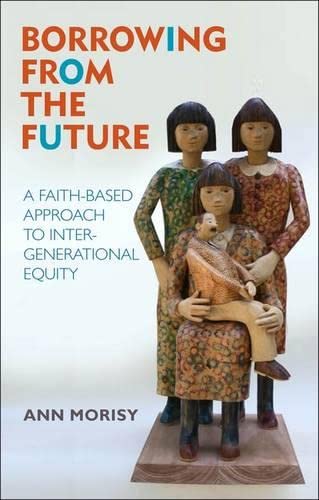Dr Helen Reid (Leeds Church Institute) shares thoughts on the older generation as a ‘pivot generation’
Adapted from a talk given by Helen at our event on 26th April 2022.

Here we have an example of people in older age who experienced fulfilment in later life. They had always lived lives of service but it was very much in their later years all that they hoped for came to pass. They always had a vision for serving God, but it wasn’t (only) about serving themselves, more broadly the people of Isarel. Here is an image of people in later life ‘embracing the view’.
I would like to pursue what ‘embracing the view’ might look like in Leeds 2022.
I will draw on the work of Ann Morisy, a Community Theologian who is now retired, and particularly on her book “Borrowing from the future” where she talks about her generation – the so called baby boomers (who of course count as youngsters to the pre-war generation). Ann Morisy writes about the older generation being a pivot generation. For Anna and Simeon it was their generation which pivoted because that was when Christ entered the world.

In our different context, what is our pivot point and what are we doing about it?
We face critical questions in our time right now because we are living in ways that are not sustainable. We have had decades of growing consumption and the pursuit of personal fulfilment, and we can’t keep up the pace as we are borrowing from the future.
We do know that our lifestyle isn’t sustainable in ecological terms – we are storing up problems that future generations
will have to contend with.
In addition, we have a pension system and social care system that relies on present contributions being made at every higher levels. Young and old are under pressure and we know that households most likely to be living in poverty are young families.
We are in a really serious position as a society and as a global population – how can the older generation be a pivot generation?
Against this background, we can look honestly at the question of ‘What is the purpose of old age?’ IF we look at the natural world, no other species has females living for decades after they can no longer produce the next generation. This has evolved for a reason.

A practical aspect is the contribution that the older generation make to raising the younger generation as they grow and emotionally supporting the middle generation as they work, create and build. I am sure that many of you here today are actively involved in this practical aspect of life. And increasing good health and people having children later in life has altered when ‘old age’ begins.
However, there is another ‘non-practical element that it is worth exploring. The psychologist Piaget identified stages of development from childhood to adulthood as we grow in conscious thought and can plan for the future and work out how to approach tasks and achieve objectives. But there is perhaps a further stage of development when we can live with contradiction and nuance; live with the things that don’t immediately make sense or are contradictory. To find a way to live well with that, to be integrated, in the terminology used in the title of our meeting – when we ’embrace the view’. This is surely a key purpose of older age too – that we can appreciate the importance of context, the relativism of knowledge and how to apply common sense in tricky situations. Of course this is traditionally called wisdom.
So perhaps instead of attempting to extend the middle stage of ‘adulthood’ for as long as possible (60 is the new 40 and so on),a pivot generation can step forward into the age and stage of wisdom without too much regret at leaving behind the so called ‘generative’ stage of adulthood. And what is more – that this isn’t just for themselves, but because it enables people to offer into our society what is so much needed.
A wisdom to challenge the ever increasing consumption that is no good for the planet, no good for the mental health of the younger generations caught up in advertising and having to live ‘amazing lives in their perfect homes with all the tech’ – and failing.

We are living psychologically beyond our means because we believe in limitless self-expansion.
Bringing compassionate wisdom to our current cultural climate at a time in life when people are less inhibited by ‘what people think’; when people can have a greater ability to live in the moment’ (older people do admittedly talk a lot about the past – but not as much as younger people focus on the future); when people are confident enough to acknowledge dependencies and needs – and our interdependencies.
Older age is a time when people are well placed to actively seek to foster an interest in ‘higher’ things and concern for others.
Developing greater abilities to live with uncertainty, relationality and connectedness. What is sometimes called Spiritual Capital – and much needed in our society facing economic and ecological challenges.
So if that is the purpose of older age – what is the purpose of faith in this? To live well in the light of an economy where those most in poverty are young working families – and in the light of climate catastrophe, is surely to live for others. Not passing on the problems to unborn generations, but acting now.
Faith communities have a long tradition of helping people to live with an awareness of others. But we have to be aware there has been a time (and for some it continues) when the Church has alienated many older people; at a time when it judged people for being divorced or gay, for example. When people felt the high standards demanded of people were demanded in a way they experienced as emotionally abusive. And that this happened at a time when society at large was opening up to people seeking personal fulfilment, allowing freedoms for single women to look after their babies; for gay people to live an integrated life.
So Ann Morisy calls for second chance theology – that older people give the church another chance. That the Church needs to witness to its greater humility, greater recognition of personal fulfilment as part of God’s plan for people. That the church needs to perhaps talk more about struggle than sin. Still recognising what Jesus achieved on the cross for our salvation. An emphasis on the fact that Jesus was showing us a way to live.
That we are called and resourced by God to live with compassionate intention – and to work out with wisdom what it means to live with compassionate intention in Leeds today.
So, the church needs to be invigorated in its mission among older people. We talk about youth work as the church of the future – well mission among older people is also about the church of the future. In the struggle against consumption, the idea that money is the answer to everything, that we should expect things to always be getting better. Being honest enough to face the fact that over-consumption means that other people have less, including the generations we don’t yet know.

So older people have, with faith, the capacity – the Spiritual Capital – the compassionate intention – to be dissenters in the progress of greater consumption, vital for future generations.
That is the view that we are embracing: It isn’t just a pretty view from the top of a hill in the countryside – it is an honest view of the challenges of our society, the role of faith in that – and a calling to purpose for those in later life – to bring to the situation that which is gifted to them at this later stage of life, to be the pivot generation.
I would recommend Ann Morisy’s book as a way to look at what that might mean in practical and campaigning terms. And I recommend the image of Anna and Simeon as inspiration for embracing the view.
Helen Reid, April 2022
